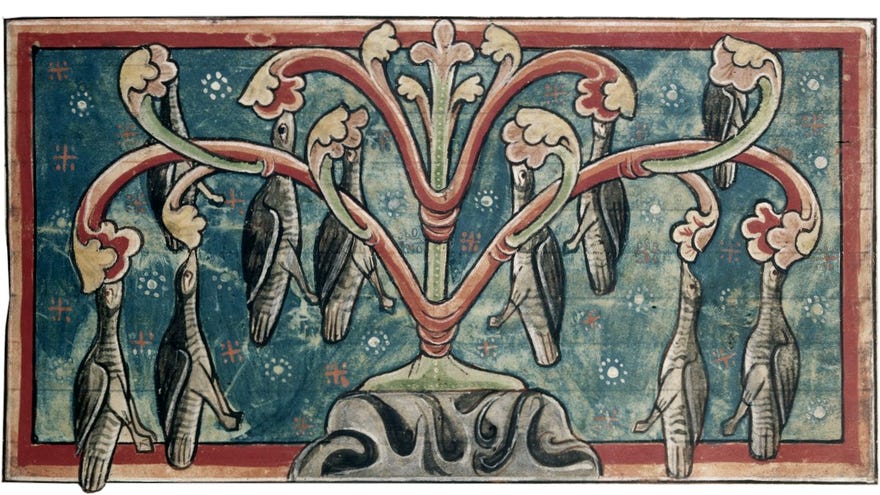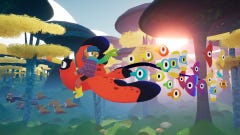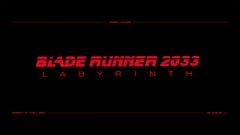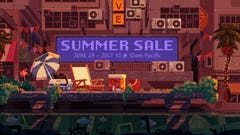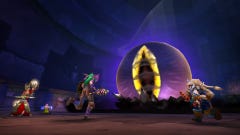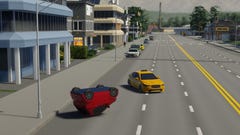Grow a whole world from your spit, tears, and piss in this weird idle clicker game
Explore abiogenesis in The Barnacle Goose Experiment
I entered a sterile biodome with nothing but myself present and nothing to do but cry, spit, and piss. This is what science looks like. From these scant three verbs, you can create a whole world in The Barnacle Goose Experiment, combining substances to spontaneously generate whole other forms of matter, life, landscapes, and oddities. Made by Everest Pipkin, it's part idle game, part clicker, and wholly fascinating. Best of all, you can play for free in your browser.
I won't show you screenshots of my end-game save because even the UI is a collection of mysteries to discover, but I'll show you how it starts:
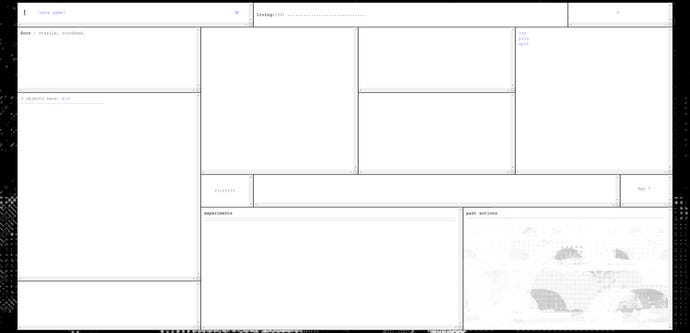
From there, you create a world. We play as an expert in the abiogenesis of bees (abiogenesis being the theory of life developing from unlife, simple compounds combining and snowballing into the wild living world we have today), who's been pressganged into isolation in a biodome for research. Just you and a sterile room. So maybe you cry a bit. Have a wee (in the corner, I hope). Then think, hey, what if combined my tears and piss? Well, dear friend, you'll have created rain. Now see what you can create with rain.
It's a game of experimenting by combining objects to create new objects, then combining those with other objects, or eating them, or smashing them, or killing them, or... soon enough, your once-empty biodome will be brimming with sand, stone, paper, fingernails, moths, geese, radios, oceans, and more.
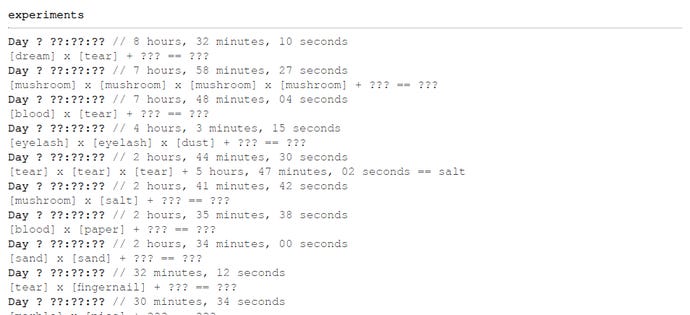
The Barnacle Goose Experiment combines idle game and clicker game. Experiments take time to run, happily chugging away while you leave the browser tab in the background, and you'll soon discover items which (slowly) automatically create other items. There's also a lot of fiddling in shuffling items around and in and out of your inventory to see potential combinations, and you often need to rummage and craft for items to re-run solved experiments just to generate more items for further experiments. And those items which idly generate more items can often be interacted with in various ways (ultimately, a lot of clicking) to boost their speed. Click, wait, fiddle, wonder.
It is a strange, uneasy, and unreal experience to slowly uncover possibilities and feel out the shape of the game, which mostly flows from the experiments. It blooms as it opens up, still surprising me with new nouns and verbs even at the end. A few sprinkles of explicit story creep in, but mostly it's you marvelling at the world you're creating by mashing everything together, weaving the fabric of reality by accident, uncertain where your work will lead.
Some combinations feel alchemical, speaking to elements and processes. Some have the logic of Minecraft crafting, where sure, yeah, I get how wood x iron = hammer. My favourite recipes feel poetic, evocative combinations which capture an essence of something. Here's one I feel I can throw out to delight you without making the game feel any more known: fire x iron x apple x dream = convertible. What a great breakdown of an American icon.
It can feel like a lot of fiddly busywork at times, but I soon stumbled into solutions, shortcuts, and aids which wildly accelerated my science—and it's hardly excessive for the click-o-idler genre. Towards the end, I even felt overwhelmed by my Eden, losing track of what everything was doing in a world grown larger than I had ever intended. Now I understand why the gods are so hands-off.
Everest Pipkin first released The Barnacle Goose Experiment in November 2022. It only came to my attention now through their announcement that they're planning to release an improved version on Steam and Itch in early summer.
"After watching how people play the game I'm digging back into code with a total refactor," Pipkin said this week. "You should be able to have hundreds or thousands of times as many objects, spaces, animals, assistants, and piles of piss. General improvements to calculation, saving, and hang time ... but I'm also scripting some new objects and interactions, particularly with a few new objects that have more agency and can act on the world."
I am excited to see that. More moving parts and forces in this world sounds good to me. I didn't discover every item (let alone every recipe) during my playthrough, so I'm up to find even more on a revisit. And sure, I won't say no to a giant pile of piss. You might want to wait for that, though I was still very pleased with the current browser version.
The game's name references an ancient myth about spontaneous or strange generation of life, where supposedly a type of barnacle produced geese. Some said a species of goose came from barnacles on driftwood, hanging by their beaks inside the shell while they grew, before taking flight or slipping into the water once feathered. We still call those species the goose barnacle and barnacle goose today. Some further believed the barnacles manifested from driftwood, while others believed there was a type of tree which fruited with barnacles producing geese. The game's title art is an illustration of a barnacle tree from a medieval bestiary. One apparent influence on the belief is that western European observers never saw barnacle geese nesting, unaware that they are migratory and breed on Arctic islands before returning for winter. Fun fact: some people ate the barnacle-born geese during their Lenten fasts, reasoning they were fish not fowl, until Pope Innocent III banned the practice in 1215.
For more on this and other myths of spontaneous generation (such as rotting flesh being the source of maggots), I enjoyed this old book you can read online. You might also like this paper which uses the barnacle myth to look at Darwin's conception of the idea of species. As you might guess, I've had a grand old time reading about barnacle geese after wallowing in piles of piss and tears and pebbles and leaves and rivers and clocks and books and beloved childhood pets inside a biodome.
